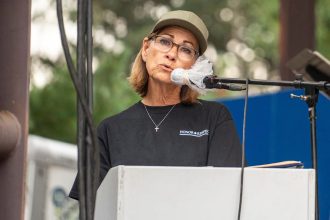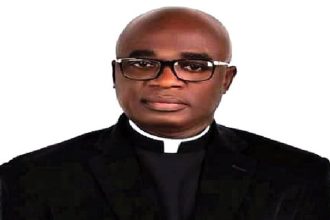Stephen C. “Steve” Cawood, an Eastern Kentucky lawyer who championed coal miners, clean water and better schools, died Oct. 17, three days after his 82nd birthday.
Stephen C. “Steve” Cawood, an Eastern Kentucky lawyer who championed coal miners, clean water and better schools, died Oct. 17, three days after his 82nd birthday.
Grandson to both a county sheriff and a circuit judge, Cawood worked to alleviate Appalachia’s poverty as a volunteer and activist. He was unafraid to challenge the region’s powerful coal industry as an attorney and one-term state legislator.
He died at Baptist Health Hospital in Lexington after a lengthy battle with bladder cancer.
“The loss of Steve Cawood will be felt throughout our commonwealth, but especially in Eastern Kentucky,” said Gov. Andy Beshear. “From protecting our state resources to increasing education access, Steve dedicated himself to work that helped build a brighter future for Kentuckians. Britainy and I are praying for his family. He will be missed.”
Environmental lawyer Tom FitzGerald of the Kentucky Resources Council said Cawood “embodied a rich tradition in Eastern Kentucky of progressive people who could have gone anywhere and been successful but decided to stay home and work with the cards dealt them to make the lives of their neighbors better.”
Pineville days
Cawood was born in Pineville on Oct. 14, 1943, to Murrell and Sophia Gilbert Cawood. His father ran a hardware store. Cawood’s maternal grandfather was Circuit Judge James M. Gilbert, who presided in Bell and Harlan counties. His paternal grandfather had been a sheriff of Harlan County. He was predeceased by his sister, Janie Cawood Brooking and brother Tom Cawood.
Cawood said in an oral history interview that his family’s social and economic position, as well as living in town, insulated him from the poverty in the surrounding countryside and coal camps.
“I grew up in the small town of Pineville and it’s a funny, peculiar kind of town to the extent that it is a very cohesive community that revolves around one little high school,” he said. “It has a very leveling effect on the children who are raised here. It did then and it does today to the extent that it was not unusual to find myself on a given summer day as a child lying on the river bank with kids from the poor section of town and kids from the wealthier section of town. Or playing in the woods or in a Scout troop or in a football game.”
“I knew there were coal miners,” Cawood said of growing up in Pineville. “There were six or eight kids in my class who were left fatherless by the Fourmile mine explosion in 1945. But I knew nothing of the life they lived at home. I had not ever been exposed to the anger. I was not raised in poverty.”
Kid from Eastern Kentucky
As a student at Eastern Kentucky University, Cawood became involved in the initial planning of President Lyndon B. Johnson’s 1964 War On Poverty.
“Shortly after the death of President Kennedy and the presidency of Lyndon Johnson, there was a think tank established in Berea, Kentucky,” Cawood recalled in a 1991 interview. The group met to talk about “how to go about designing a program to have socio-economic change in Appalachia, ” he said, and “basically designed” the Economic Opportunity Act, the 1964 law that was the centerpiece of the Johnson era War on Poverty. The Berea confab pieced together what became the Appalachian Volunteers, a kind of domestic Peace Corps.
“I got involved because they (those organizing the War On Poverty) wanted kids from Eastern Kentucky to advise them,” Cawood recalled. “They were looking for ideas. They didn’t pretend to have all the answers.”
The impetus for this effort came from President John F. Kennedy’s tour of West Virginia during his 1960 primary campaign. Kennedy “was shocked by what he saw in West Virginia,” Cawood said.
Steve Cawood, 5, lower left, carried the queen’s train at the Mountain Laurel Festival at Pine Mountain State Park. Gov. Earle Clements was on hand to crown her. (Cawood family photo)
In his senior year at EKU, Cawood joined the Appalachian Volunteers, which he described as a “ragtag bunch of bright, caring people.”
Initially under the Council of the Southern Mountains, the Appalachian Volunteers, or AVs, took on community projects such as repairing schools, winterizing homes and leading recreation programs. The group split off in 1966 and took a more activist stance, helping organize local citizens groups, pushing for poor people to have more say in anti-poverty programs and supporting protests against surface mining, according to “Uneven Ground: Appalachia Since 1945” by Ronald D. Eller and The Kentucky Encyclopedia.
Politicians in Appalachia came to regard the AVs as a threat to local power structures. The federal government cut funds and the program closed in 1970, though many members stayed on and continued their advocacy.
Cawood later said the AVs’ most lasting contribution was giving individuals like Eula Hall the courage to speak up and gain support. Hall was an Appalachian activist and health care pioneer who founded the Mud Creek Clinic in Grethel in Floyd County.
In his second year of law school at the University of Kentucky, Cawood married Jeanette “Sissy” McCauley, the daughter of a Middlesboro mayor, who was starting her junior year of college. They would have two daughters: Beth (Bill) Overman of Lexington and Mandy (JD) Hickey of Lookout Mountain, Tennessee, and five grandchildren.
He was in a group of law students who went to Bell County one summer to find out what legal services were needed. The “raw anger” and tremendous poverty he encountered made a permanent impression on him, he said, in part because he had grown up in Bell County oblivious to the conditions.
In 1968, Cawood helped coordinate Robert F. Kennedy’s presidential campaign tour of Eastern Kentucky. He rode in the car with Kennedy. “I was getting ready to join (the campaign) when Bobby was killed (June 5, 1968),” said Cawood.
Working with coal miners
On Dec. 30, 1970 an explosion at the non-union Finley Mine at Hurricane Creek near Hyden killed 38 men, bringing attention to lax enforcement of federal mine safety laws. Cawood represented survivor A.T. Collins who was blown out of the mine by the explosion.
Phil Primack, who had started working as a reporter at The Mountain Eagle a few months earlier, first met Cawood when he covered the disaster. Cawood “became an invaluable guide to mine safety laws, multiple violations of which led to the explosion, as well as the failures of state and federal regulators to enforce them,” Primack said.
“When he represented A.T. Collins, the disaster’s sole survivor, Steve was more than just the attorney for an individual — he stood for all coal miners and their families and communities,” Primack said. “He was a caring and passionate advocate, a great storyteller, and a good friend.”
Cawood represented striking miners at the Brookside mine in Harlan County in 1973-74 and traveled with them on tours of the country.
Cawood also represented opponents of strip mining in a group called Save Our Kentucky.
Cawood helped spotlight the plight of coal miners suffering from black lung, an incurable occupational disease caused by breathing coal dust. He completed a legal services survey identifying injustices facing black lung victims. He recalled that some of those involved in the survey later became instrumental in the Black Lung Movement, demanding recognition and compensation for health damage and better dust control in mines.

Steve Cawood served on the board of the Louisville & Nashville Railroad Historical Society. He stands at the south portal of the L&N’s Hagans Tunnel running under Stone Mountain and connecting Loyall, Kentucky, and Hagan, Virginia. It’s now part of CSX. (Photo courtesy of Ron Flanary)
Working for the Presbyterian Board of Missions, he helped launch the Appalachian Research and Defense Fund or AppalReD, which still provides legal services to low-income people across the region.
In Pineville, Cawood, a Presbyterian, became city attorney, president of the Pineville Chamber of Commerce and chairman of the Salvation Army Board. He was a member of the Sierra Club and Masons and served on the Governor’s Task Force on Floods and the Pineville Flood Evacuation board.
Stephen Ford, then a reporter for the Courier Journal in Louisville, covered widespread flooding in Eastern Kentucky in 1977. “Pineville was inundated by the Cumberland River,” he recalled. “Most of the town was under water, and it was completely inaccessible by road. I was able to get to Pineville on a boat operated by the Army Corps of Engineers. The Cawoods’ house was on dry ground on a hillside, and Steve and Sissy immediately offered their home as a makeshift news bureau. Local reporters and I were able to work there.
“I suppose as an activist lawyer and someone with modest political aspirations, Steve felt comfortable working with the press. But I also think he deeply loved Pineville and Bell County, and he truly wanted people elsewhere to understand the grave crisis and destruction his community faced.
“That was characteristic of Steve. He stood ready whenever called upon to make contributions, large and small.”
Courier Journal reporters and editors began jokingly referring to Cawood’s office as the “Pineville bureau,” a place where reporters could write, make calls or just collect their wits and some good stories.
Like many in Pineville, the Cawoods were involved in putting on the annual Mountain Laurel Festival at Pine Mountain State Park. His wife has a photo of Steve at age 5 serving as a train bearer for the festival’s queen with the late Gov. Earle Clements in the background.
Recovery
Sissy Cawood said her husband “would want others to know there is a good life in sobriety” and that he “earned” a chip for 29 years of sobriety in August. Her husband, she said, was grateful to Alcoholics Anonymous and his sponsor, Al Smith, the founding host of Kentucky Educational Television’s “Comment on Kentucky.”

From right, Steve Cawood, Sissy Cawood and Neale Bennett, past president of the Kentucky Mountain Laurel Festival. (. (Facebook)
Smith’s sponsorship “was not an easy job,” Sissy Cawood said, “as Steve dealt with feelings of anger, frustration and whatever else alcohol does to your brain after a lifetime of drinking.”
Smith’s wife, Martha Helen Smith, asked Cawood to speak at Smith’s memorial service in 2021. “Al thought the world of Steve,” she said.
Frankfort
In 1980, Cawood, a Democrat, was elected to the state House of Representatives and quickly made a name for himself.
House Speaker Bill Kenton appointed Cawood to chair the House subcommittee on strip mining, which overhauled Kentucky’s law to meet tougher federal standards enacted by Congress in 1977.
“Add his black-lung efforts and other legal work for miners, and you have one of the greatest bodies of work of any Kentuckian to protect people in the mountains from the adverse effects of what was their major industry. I am proud to have been his friend,” said Al Cross, emeritus journalism professor at the University of Kentucky.
Former House Speaker Greg Stumbo, D-Prestonsburg, entered the House in 1980 with Cawood.
“Steve Cawood had a good moral compass. Everything he did was for the right reasons — whether it be for the environment or the people of Eastern Kentucky,” said Stumbo. “He had to walk a tightrope sometimes in his political battles, and he failed, like all of us, sometimes. But he represented the kind of person in government that we need more of today. He was willing to reach across the aisle to work with his political opponents if he knew that was the right thing to do for the people.”
Rocky Adkins, Beshear’s senior adviser and a longtime friend of Cawood, said, “Steve Cawood was a true and trusted friend, and I was lucky to know and work with him for years. We were focused on making our state a better place for families — especially in our home of Eastern Kentucky. This is a tough loss, but I know his legacy will continue on. Leah and I are praying for Steve’s family.”
Former state representative and chairman of the Kentucky Democratic Party Jerry Lundergan, of Lexington, was also in the House’s freshman class of 1980.
“You didn’t have to talk to Steve Cawood very long to tell where his interests were. They were in Eastern Kentucky,” said Lundergan. “At an early meeting with Greg and me, Steve wanted us to be sure to know how important the severance tax on coal was to Eastern Kentucky. He was a model citizen-legislator.”
Cawood lost his bid for reelection to another Democrat, Pearl Ray Lefevers, but remained a citizen activist.
Advocacy
He was one of the early members of the Prichard Committee for Academic Excellence which advocated for the Kentucky Education Reform Act of 1990. He took the challenge of reform seriously and ran for the Pineville Independent school board. He became its chair, hired a new superintendent and worked to create a space between the old and new schools called the Commons that became a community venue in Pineville as well as a place for students.
Cawood worked to protect his region’s water and forests. He collaborated on successful legal efforts to protect the watersheds that supply Pineville and Middlesboro from the effects of mining. He was a supporter of the Kentucky Natural Lands Trust, especially its efforts to preserve Blanton Forest in Harlan County.
In his later years, Cawood, a railroad buff, worked on moving archives of the Louisville & Nashville Railroad from a basement in Bowling Green to the Tennessee Rail Museum in Chattanooga where they are now housed.He did the legal work and negotiations at no charge because of his lifelong love of trains, Sissy Cawood said.
He also assisted Dr. John Fox, a Lexington surgeon, in identifying pioneer Daniel Boone’s actual steps through Kentucky.
For fun, Cawood amassed a large collection of scrip, currency used to pay coal miners that was redeemable only at stores owned by the coal company that employed them.
James Branscome, a journalist and retired managing director of Standard & Poor’s, has known Cawood since 1971.
“Of all the mountain advocates for miners and others in Eastern Kentucky, I don’t know of anyone who has been the source of more information for journalists, congressional staffers, fellow attorneys, organized black lung groups, and labor leaders like the United Mine Workers Association,” said Branscome.
“Steve was a highly respected source for the latest news on topics related to coal and miners, coal history, and virtually any topic related to Appalachia, and especially black lung and black lung regulation and compensation.
“He was a frequent visitor with friends for trout fishing and camping in the Cherokee National Forest in Tennessee. He and Sissy vacationed on Pawley’s Island, South Carolina, almost every year.”
Funeral arrangements are pending.
Information for this article also was provided by journalists Bill Bishop, Bill Estep and Ron Flanary.









